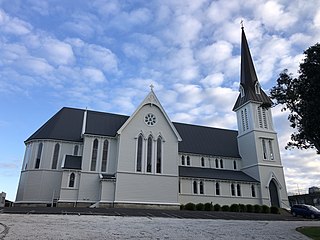
The Cathedral of the Blessed Virgin Mary is a Church of England cathedral in the city of Truro, Cornwall. It was built between 1880 and 1910 to a Gothic Revival design by John Loughborough Pearson on the site of the parish church of St Mary. It is one of only three cathedrals in the United Kingdom featuring three spires.
The Anglican Church in Aotearoa, New Zealand and Polynesia, formerly the Church of the Province of New Zealand, is a province of the Anglican Communion serving New Zealand, Fiji, Tonga, Samoa, and the Cook Islands. Since 1992 the church has consisted of three tikanga or cultural streams: Aotearoa, New Zealand, and Polynesia. The church's constitution says that, among other things, it is required to "maintain the right of every person to choose any particular cultural expression of the faith". As a result, the church's General Synod has agreed upon the development of the three-person primacy based on this three tikanga system. It has three primates (leaders), each representing a tikanga, who share authority.

The Diocese of Auckland is one of the thirteen dioceses and hui amorangi of the Anglican Church in Aotearoa, New Zealand and Polynesia. The Diocese covers the area stretching from North Cape down to the Waikato River, across the Hauraki Plains and including the Coromandel Peninsula.

Holy Trinity Cathedral is an Anglican cathedral church situated in Parnell, a residential suburb of Auckland, New Zealand. It is the 'mother church' of the Anglican Diocese of Auckland and the seat of the Bishop of Auckland. The current main church building was consecrated in 1973.

The Diocese of Dunedin is one of the thirteen dioceses and hui amorangi of the Anglican Church in Aotearoa, New Zealand and Polynesia.

The Anglican Church of Melanesia (ACoM), also known as the Church of the Province of Melanesia and the Church of Melanesia (COM), is a church of the Anglican Communion and includes nine dioceses in the Solomon Islands, Vanuatu and New Caledonia. The Archbishop of Melanesia is Leonard Dawea. He succeeds the retired archbishop George Takeli.

George Augustus Selwyn was the first Anglican Bishop of New Zealand. He was Bishop of New Zealand from 1841 to 1869. His diocese was then subdivided and Selwyn was Metropolitan of New Zealand from 1858 to 1868. Returning to Britain, Selwyn served as Bishop of Lichfield from 1868 to 1878.

The Reverend Frederick Thatcher was an English and New Zealand architect and clergyman.

St Paul's Church is an historic Anglican church, located on Symonds Street near the University of Auckland and Auckland University of Technology, in the central business district of Auckland, New Zealand. The church is the longest established church building in the city and has one of the largest Anglican congregations in Australasia.

All Saints' Church is a heritage-listed Anglican church located in Dunedin, New Zealand. Established in 1865, the church is part of the Dunedin North parish in the Diocese of Dunedin.

Ross Graham Bay has been the 11th Bishop of Auckland in the Anglican Church in Aotearoa, New Zealand and Polynesia since 17 April 2010.

Peter J. Beck is an Anglican priest in New Zealand. He was the dean of ChristChurch Cathedral in Christchurch from 2002 until December 2011 when he resigned to contest a vacancy on Christchurch City Council in a 2012 by-election.
Archdeacon Hone Kaa was an Auckland-based Anglican church leader, child welfare advocate and social-justice campaigner. He was a Māori of Ngāti Porou and Ngāti Kahungunu descent.

Holy Trinity Church is a heritage-listed Anglican building at 12 Henui Street, Fitzroy, New Plymouth, New Zealand.

The Taranaki Cathedral Church of St Mary is an Anglican cathedral church, located at 37 Vivian Street, New Plymouth, in New Zealand. Following the 2011 Christchurch earthquake, in 2016 the cathedral was closed for repairs.

The Church of the Holy Sepulchre is an historic Anglican church located at 71 Khyber Pass Road, Grafton, near the CBD of Auckland, New Zealand.
Jeanette Margaret Gosney is a British retired Anglican priest. She served as Archdeacon of Suffolk in the Diocese of St Edmundsbury and Ipswich from 2020 until her 2023 retirement. She was previously a chaplain, theological college tutor, and in parish ministry.

Auckland City Mission is a New Zealand based charitable trust. It was established in 1920 in central Auckland, by then Auckland City Missioner Reverend Jasper Calder, as part of the Anglican Diocese of Auckland, and responds to poverty in the city, providing access to permanent and sustained housing, nutritious food, and physical and mental health services. Soon after its centenary in 2020, the Mission opened its purpose-built building called HomeGround.
Jasper Cyril Austin Calder (1885–1956) was a New Zealand Anglican priest who established the Auckland City Mission in 1920 and was Chair and Missioner for its first 26 years.

Te Henui Vicarage from New Plymouth, New Zealand, is one of the heritage buildings of the city, registered by Heritage New Zealand as a Category 1 Historic Place, situated in the suburb of Strandon. It features the symbol of the undivided diocese of New Zealand (1841–1856) affixed to the front elevation.


















